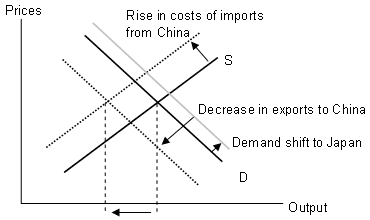With the containment of severe acute respiratory syndrome (SARS) and the confusion surrounding it, interest in the Chinese economy is now returning to the fate of the yuan. Like the spread of SARS, an appreciation of the yuan is likely to have a negative impact on the Japanese economy through an "income effect," stemming from the slowdown of the Chinese economy, and a "price effect" brought about by the surge in price of Chinese goods in world markets.
First, let us think about the income effect. If the yuan strengthens, the competitiveness of Chinese products in world markets will fall, and the Chinese economy will lose steam as a result. Furthermore, because China's economy is heavily reliant on trade processing, this should lead to a slowdown in Japan's exports of parts and components to China. Industries such as machinery, whose dependence on exports to China is increasing, will also likely be hard-hit.
Second, turning to the price effect, we can see that a rise in the price of Chinese exports will simultaneously push up both the input prices and output prices of Japanese industries. Generally speaking, for industries that compete with China the effect on output prices will be strong, and output and profits will both rise. It is therefore likely that labor-intensive industries in which Japan no longer enjoys a comparative advantage will benefit from a stronger yuan. By contrast, for industries that are in a complementary relationship with China on the input front, the increase in input prices would exceed that of output prices, therefore causing both output and profit to fall. From the standpoint of individual Japanese firms, it can be said that a stronger yuan would boost the competitiveness of companies whose products compete with those from China in both domestic and international markets, while it would hurt firms that procure intermediate goods from China, because of the rise in production costs.
When we think of the overall effect of a strong yuan on Japanese industries in general, especially in terms of the price effect, the larger the share of industries that compete with China, the greater the benefits. However, if the share of industries that outsource to China is larger, the demerits are greater. There is clearly a division of labor between Japan and China in which China specializes in labor-intensive products, while Japan hosts more technology-intensive industries, such as the production of precision machinery. Thus, it is clear that the two countries are in a complementary relationship. Also taking into consideration the aforementioned negative income effect, on an overall basis, a stronger yuan is more detrimental than beneficial to the Japanese economy. Meanwhile, for the Japanese consumer, a rise in the cost of Chinese products signifies a decline in income in real terms.
If the effects of a stronger yuan are considered within the framework of supply and demand, their similarity to the effects of the spread of SARS becomes clearer (diagram). First of all, in the event of the yuan's appreciation, the competitiveness of Chinese products declines, while in the case of SARS, production in China falls because of factory closures. If output in Japan can be boosted to compensate for this, it would help support the Japanese economy. However, when we consider the fact that Japanese and Chinese products do not compete with each other too much, such effects are likely to be limited (While the demand curve would shift to the right, it would be a small shift.) In contrast, should the Chinese economy slow down as a result of the yuan's appreciation or SARS, Japan's exports to China will undoubtedly fall (The demand curve would shift sharply to the left.) Furthermore, from the point of view of supply, any increase in the price of imports from China as a result of a stronger yuan or SARS would signify a rise in production costs for Japanese firms, thus becoming a factor that would dampen output (The supply curve would shift sharply to the left.) As this shows, a stronger yuan and the outbreak of SARS would both adversely affect output in Japan.
So despite this fact, why do calls in Japan for a stronger yuan not subside? There may be some who believe that Japan and China are in a competitive relationship and seriously think that an appreciation of the yuan would help boost the economy. On the other hand, there may be many politicians who want to cling to their own interests under the guise of speaking out for Japan's national interests.
| Diagram : | The effects of SARS and a stronger Yuan on the Japanese economy |
 | |


